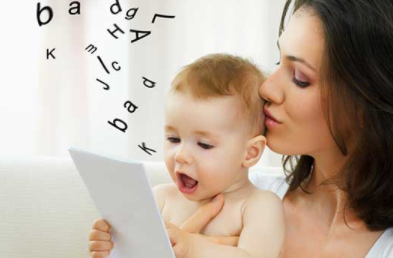(单词翻译:单击)
You know that feeling when you get tongue-tied, and words come out as a jumbled mess?
你知道舌头打结,话说不明朗的那种感觉吗?
Maybe you forget a word, or have mushy grammar, or your pronunciation is all wrong.
也许你忘了要说什么,或者语法混乱,或者发音错误。
There are a lot of things to keep track of!
有很多原因!
It seems like learning one language would be hard enough for babies,
对宝宝来说,进食和呕吐已经是个折磨
who already have trouble eating and not spitting up everywhere.
学习一种语言似乎对他们来说够难了
But research has shown that infants are a lot more capable than you might think, especially when it comes to language.
但研究表明,宝宝比你想象的有能力的多,尤其是在语言方面。
In fact, a lot of babies from bilingual families grow up fluent in both languages.
事实上,许多双语家庭的宝宝在两种语言的环境下成长的很好。
Many psychologists think language is what's called an innate ability,
许多心理学家认为语言是天生的,
or something we're born knowing how to do, like grasping objects and sucking on things.
或者说生来就知道怎么去做的事情,比如抓东西和吸东西,
Classic cute baby stuff!
宝宝太可爱了!
So right from the start, babies are primed to learn a language – any language.
所以从一开始,宝宝就蓄势待发,时刻准备着学习一门语言——任何语言
Most of us adults have trouble hearing subtle inflections in foreign languages.
我们大多数成年人听不懂外语的词形变化。
Like, if you only speak English, it might be hard for you to hear the difference between certain sounds in Thai or Russian.
比如,如果你只会英语,你可能很难听懂泰语或俄语中某些声音的区别。
But in their first few months of being alive, babies can tell really similar sounds apart.
但宝宝在生下来的头几个月能分辨出非常相似的声音。
To figure this out, lots of researchers have done studies where they pick a sound from a foreign language
为了找清楚原因,很多研究人员都做过这样的研究:挑选一种外语声音,
and play it on loop for babies around four months old.
然后,对4个月大的宝宝进行循环播放。
When the babies lose interest, the researchers switch to a new, similar sound.
当宝宝失去兴趣,研究人员新播放一种类似的声音
Usually, these really young infants notice the difference and perk up somehow, like by looking around or sucking harder on a pacifier.
通常情况下,这些宝宝会注意到其中的差别,且表现的比较亢奋,比如环顾四周,或者使劲吮吸奶嘴。
But if scientists repeat this experiment around eight months later,
但是如果8个月后科学家们重复这个实验,
one-year-old babies typically ignore the second sound because they don't notice a difference.
一岁大的宝宝通常忽略第二种声音,因为他们没有注意两种声音的区别。
That's probably because as they get older, their brain cells make connections that help them focus on the sounds of their native language,
这可能是因为随着年龄的增长,脑细胞建立连接,帮助他们专注于母语的发声,
and they get rid of unused connections related to recognizing other sounds.
且未使用的,与其他声音识别有关的连接就会被消除。
So, by the time an infant is one year old, its brain is already focusing on learning whatever language it's been exposed to most.
宝宝在一岁的时候,大脑已经开始专注学习平日里接触最多的语言。
And, surprisingly, babies don't need any special training to be bilingual!
而且,出乎意料的是,宝宝不需要接受任何特殊训练就能学会两种语言!
But they need equal exposure to both languages.
但他们接触两种语言的机会得是一样的。
Now, you might have heard that bilingual kids develop more slowly than their monolingual counterparts,
你可能听说过,双语孩子比单语孩子发育得慢
or are more likely to have speech delays.
或者双语孩子比单语孩子更有可能晚说话。
But, according to the research, that's just not true!
但是,根据研究结果,这种说法是不正确的!
That even applies to babies who grow up with one spoken and one signed language –
这甚至也适用于在口语和手语环境中长大的宝宝,
like English and American Sign Language.
比如英语和美国手语,
As they get older, these kids keep their languages separate thanks to their awesome perception skills.
随着年龄的增长,这些孩子因为感知能力的不同,语言能力也会有所不同。

Just by watching faces and listening to verbal patterns,
孩子在三岁的时候,仅仅通过观察面部表情和聆听语言交际模式,
they're able to figure out when they should be speaking which language by around the time they're three years old.
就知道什么时候应该说哪种语言。
And when they intentionally switch from speaking one language to another,
有意切换使用两种语言,
like talking to their friends in English but to their mom in Cantonese, that's called code-switching.
比如和朋友用英语,和妈妈用粤语,我们称之为代码转换。
Now, even though monolingual and bilingual babies develop at the same rate,
如今,尽管单语和双语宝宝的发育速度相同,
one study from the University of Washington suggests that their brains process language a little differently.
但华盛顿大学的一项研究表明,单语和双语宝宝的大脑处理语言的方式略有不同。
Psychologists used electroencephalograms, also known as EEGs,
心理学家使用脑电图
to detect electric brain activity in some six-month-old monolingual and bilingual babies as they played recordings of speech sounds in English and Spanish.
来检测播放英语和西班牙语的语音录音时6个月大的单语和双语宝宝的脑电图
Babies in EEG caps? Super adorable.
宝宝戴着脑电图帽?超级可爱的。
They found that monolingual babies caused a spike on the EEG whenever a mismatched sound popped up,
他们发现,每当出现不匹配的声音时,
like a Spanish sound thrown in among a bunch of English sounds or vice versa, which means they noticed a difference.
比如一连串的英语夹杂着西班牙语,单语宝宝的脑电图上有一个尖峰,这意味着他们注意到了不同。
But bilingual baby brains didn't notice when the languages switched.
但是双语宝宝的大脑并没有注意到两种语言的变化。
When the same babies were 10 to 12 months old, though, the results changed:
宝宝长至10~12个月大的时候,结果产生了变化
The monolingual baby brains only responded when a sound in their native language interrupted a string of foreign sounds.
当母语声音收到一连串外语声音的干扰,单语宝宝的大脑才会做出反应,
But not the other way around.
但双语宝宝不是这样。
And the bilingual babies went from not noticing a difference, to hearing both kinds of mismatches.
双语宝宝从没有注意到两个声音的差异到听到两种声音不匹配。
According to the researchers, this means that monolingual baby brains seem to solidify connections faster,
研究人员表示,这意味着似乎单语宝宝的大脑巩固连接,
to get ready to speak their primary language.
准备好说母语的速度更快。
But the bilingual baby brains stayed more flexible and didn't develop that wiring until later on.
但是双语宝宝的脑袋更灵活,直到后来这条线路才被开发出来。
Turns out that this flexibility can have some developmental perks, too.
事实证明,这种灵活性也有好处。
One study published in the journal Science found that
发表在《科学》杂志上的一项研究发现,
bilingual babies may be better at learning rules and switching between them than monolingual babies.
和单语宝宝相比,双语宝宝可能更擅长学习规则,在两种语言规则中来回切换的能力更强。
In the study, one-year-old infants were taught that,
研究中,告诉一岁的宝宝:
when they heard a certain pattern of sounds, they should look at a specific spot on a screen to see a fun toy.
当听到某种类型的声音时,在屏幕的特定位置看到一个有趣的玩具。
When the psychologists changed the pattern and moved the toy picture,
当心理学家改变了这一模式,移动了玩具图片的位置
the bilingual babies were better at figuring out the new rules and looking for the toy in the right places.
会说两种语言的宝宝更善于发现新规则,会在正确的地方寻找玩具。
Multiple studies suggest that bilingual adults have similar benefits, like better focus and ability to switch between tasks,
多项研究表明,双语成年人拥有的益处与之类似,比如专注力和任务间的切换能力会更好一些,
and even less cognitive decline when they get older.
且随着年龄的增长,认知能力的下降较少。
But this doesn't mean all hope is lost if you're not bilingual – it's just one path a human brain can take.
但这并不意味着如果你不会说两种语言,你就没有这些能力,这只是针对人脑而言
Our brains are really powerful, and even when you were a tiny, adorable baby,
我们的大脑非常强大,甚至当你还是个可爱的小baby的时候,
you were a lot smarter than you might think!
你就比你想象的要聪明得多!
Thanks for watching this episode of SciShow Psych!
感谢收看心理科学秀节目。
And special thanks to our patrons on Patreon who are helping us explain the human mind!
特别感谢Patreon对本节目的大力支持,
If you'd like to support the show, just go to patreon.com/scishow.
如果你想支持我们的节目,就访问patreon.com/scishow吧。
And to be the first to see new episodes like this, be sure to visit youtube.com/scishowpsych and subscribe!
如果您想第一个看到我们的剧集,一定要访问并订阅youtube.com/scishowpsych哦!


